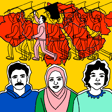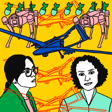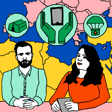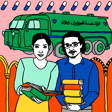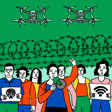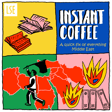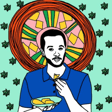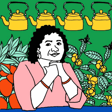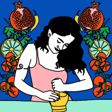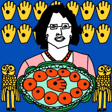Become a Creator today!Start creating today - Share your story with the world!
Start for free
00:00:00
00:00:01

2.1. Beetroot Hummus and Culinary Appropriation with Fadi Kattan
In this first episode, Fadi Kattan speaks with Sara Masry about everything from Palestinian cuisine in Chile and Haiti to why you shouldn't make chocolate and beetroot hummus.
Fadi is a Franco-Palestinian chef from Bethlehem. He opened his own restaurant, Fawda, in Bethlehem in 2016. Alongside his restaurant, he pioneered the region’s first food tours. Fadi’s approach to food is informed by his passion for sharing the stories of the local foragers, gardeners, farmers and cooks that have shaped the culinary heritage of Palestine.
Sara is an actor, writer and a partner at Basima's Kitchen, where she and her sister Alia serve up dishes from their Saudi and Palestinian heritage, inspired by their late grandmother Basima.
Transcript
Season 2 Introduction: Focus on Middle Eastern Food
00:00:00
Speaker
This is Season 2 of Instant Coffee, your quick fix of everything Middle East. We're very excited to be back and this time around we're exploring our favourite topic, food. Nadine and I could spend hours talking about Showerma and Knéefé. But we decided to spare you all and instead we are taking the opportunity to go beyond the plate. We want to understand how the complexities of food, farming and cuisine in the region are shaping people's writing, thinking, cooking and organising.
Food and Identity: Culture, Farming, and Cuisine
00:00:27
Speaker
We'll be speaking with inspiring individuals who are grappling with culinary appropriation, access to food and food sovereignty, reconnecting with food in the diaspora, archiving and translating the region's recipes and more.
Chef Fadi Khatan: Palestinian Cuisine and Heritage
00:00:43
Speaker
We're kicking off this season with an interview with chef Fadi Khatan, the voice of modern Palestinian cuisine. Fadi opened his own restaurant and pioneered the region's first food tours.
00:00:55
Speaker
His approach to food is informed by his passion for sharing the stories of the local farmers and cooks that shaped the culinary heritage of Palestine. We recorded this episode a couple of months ago before the latest attempt to forcibly remove Palestinians from their homes in Sheikh Jarrah and the catastrophic Israeli assault on Gaza. We asked Fadi to speak again. What you will hear first are his reflections from Bethlehem. The beauty of
00:01:25
Speaker
cuisine is that our kitchen goes beyond all of these religious differences and yet maybe this time again it forced people to think about not only the physical, violent occupation but all the layers of this system that has been put in place and notably one of them that we did discuss a lot in the episode
Culinary Appropriation: Palestinian Culture
00:01:52
Speaker
which you'll be hearing, which is culinary appropriation and cultural appropriation. To make it as simple as possible, and I am no politician, what happened in 1948 was the dispossession of people, not only of their lands, of their properties, but also of their culture, of their kitchen, of all facets of their life. And since then,
00:02:23
Speaker
There's been a general consensus of questioning whose story is true. For me, there's no true story. There's a reality. And the reality is we could all live together as long as justice is present. And what does justice mean?
00:02:51
Speaker
I've been thinking a lot about this justice in the last 15 days, and I have no answer. What is justice to the mother who lost her children in Gaza? What is justice to the child who's lost all of her family in Gaza?
Justice and Culinary Origins
00:03:12
Speaker
It's not reconstruction. It's not pumping international aid money into Gaza. It's not
00:03:20
Speaker
going on in the silence of finding a real solution. And I don't think it's another international peace conference that's going to get us any closer to this. What would get us closer is maybe to start dealing with every single detail of the past 73 years. And healing. And healing for me as a shelf is already to see that
00:03:49
Speaker
our kitchen is given its right place. It's seeing that people are becoming honest, just as they were very honest when they separated into people that are pro-Israeli and pro-Palestinian. Actually, I don't want people to be pro-Palestinian or pro-Israeli. I want people to be pro-justice, pro-right. And with the kitchen, it's the same thing.
00:04:20
Speaker
When you use fritke, wherever you are, say it's Palestinian. When you use lebanjemid, say it's Palestinian. When you cook hummus, don't do beetroot hummus. Respect the kitchen, because maybe the concept that disturbs me when often people say, oh, but eating around the table will make peace.
00:04:48
Speaker
I don't think so, because if one is the aggressor and the other is the aggress, food's not going to heal people. But at least justice towards what our culinary differences are, what our culinary rights are, is something that is essential. And that's not only valid for Palestine, it's valid for all of the world. If you're
00:05:15
Speaker
Indigenous in the south of the United States, maize is yours, regardless of whatever anybody else is going to be telling you. But having it acknowledged makes a difference. And with our kitchens, I think that's a necessary instant that has to happen. I know having this episode about food may appear to some futile
00:05:43
Speaker
in the reality of what happened in the last few weeks. And I have no claim to be a freedom fighter. But I think every part of Palestinian life has to go on. And for the ones that are listening that are not in Palestine, people are still going on with their lives in Gaza, in Jerusalem, in Bethlehem, in Haifa.
00:06:12
Speaker
Lives go on. It doesn't mean we forget. It doesn't mean we belittle what happened to our people in the last few weeks. But it means that we're still resilient. The day you stop hearing about Palestinian food and Palestinian music and Palestinian art and Palestinian literature is the day we would have given up.
00:06:41
Speaker
On the rest of the episode, you will hear Sara Masri talking to Fadi. Sara is a partner at Basima's Kitchen, where she and her sister Halia serve up dishes from their Saudi and Palestinian heritage. So, hi Fadi, I'm really excited to be talking to you today. Thank you for coming on the show. And firstly, I'm curious to know what brought you into the world of cuisine and Palestinian cuisine. Hi Sara, I'm equally excited and
00:07:11
Speaker
Really happy to be sharing this podcast with you guys. What got me to Palestinian cuisine? Well, like a lot of chefs, my grandmother's kitchen. I mean, we all say the same thing, but it's because it's really a formative moment when you're a young kid running around your grandmother's kitchen and discovering tastes and textures.
00:07:35
Speaker
And that either evokes a passion in you or not. And in my case, it made me into two things. One, wanting to cook and two, adoring to eat. And I was very lucky with my mother's mother, my Teta Julia, who cooked both Palestinian and other juzines. I come from a family that
00:08:00
Speaker
On my father's side, my grandparents had settled in Japan, and then India, and then came back to Palestine. And they came back with also a bit of the cuisine. Sadly, I didn't get to know my grandmother, but the cuisine did stay in my grandfather's kitchen. And on my mother's side, my grandmother and grandfather were very much Francophones and actually French, Palestinian French. And therefore, there was also this influence.
00:08:29
Speaker
I then decided to go off, my first degree was not at all in the world of food and hospitality, but then I did a specialised degree in hospitality and I spent most of the time in the university's kitchen with the chef and that's where the passion started, taking a professional shape. When I came back to Palestine,
00:08:54
Speaker
around 20 years ago I actually worked in a totally different field and then five years ago I opened my restaurant and it was a great moment because I could really share this love for Palestinian produce that I have and it was really
00:09:11
Speaker
eye-opening to see how little known our cuisine is worldwide. So it was really a fantastic vehicle to elevate the cuisine we have and the produce, but also to give back to people what they deserve. And for me, the heroes of Palestine cuisine are two types of people, the grandmothers and the farmers. Yeah, I definitely agree with so much of what you said.
00:09:40
Speaker
And it sounds like, from what you explained, food was really a way that you connected deeply with your family and also kept your national identity and it helped kind of solidify that. And it showed, it really shows in the way that you describe, traveled kind of all throughout the world. And that reminds me of something that you said in another talk I heard about, I think it was,
00:10:07
Speaker
Palestinians who emigrated to Chile and although they, you know, over the generations, they stopped even speaking Arabic, but they kept traditional recipes and now that's stayed with them. I think it was like Luba or some recipes that they've altered a little bit, but it's still, you know, that's still a very core part of their, of how they keep in touch with their culture.
Global Adaptation of Palestinian Cuisine
00:10:35
Speaker
Now, it's fascinating with the Palestinian diaspora, wherever they are, and Chile was an example because that's where the largest diaspora is, how today, three, four generations down the road, they've
00:10:50
Speaker
maybe let go of a lot of things because of how they were perceived. If we take Chile as an example, when the first Palestinians went to Chile, they traveled on Ottoman passports and they got known in Chile as turcos, as the Turks.
00:11:07
Speaker
They very quickly tried to assimilate, and part of it was the language so their children were not taught Arabic, but they preserved the cuisine. And yes, macruga is one of them, but there's so many. In each country, the adaptation was different because in some places like Chile, there was no lamb. So all of the lamb-based dishes like macruga became beef-based.
00:11:35
Speaker
There was no white, fresh cheese, so the knefer they took with them was the traditional knefer of Bethlehem that doesn't have cheese, not the Nabulsi knefer we know with the cheese. In places like Haiti,
00:11:51
Speaker
they adapted the names to the French chéole, so all of a sudden these, you know, Fatahir, Sabaneir becomes Beniet, Epinar, but they also used local produce. So you have plantains that show up in Haiti's cuisine, in Palestinian cuisine in Haiti. And across the globe, this is what happened with the diaspora's cuisine. It's a very strong
00:12:16
Speaker
national bond, but also a very strong family bond. So very finally, in a lot of these communities, when people are entertaining non-Palestinian, they will cook more of the local cuisine of the country. But when they're having family gatherings, they will cook Palestinian cuisine.
00:12:38
Speaker
Well, that kind of also brings to mind the idea of cultural appropriation is one of the things that cooking Palestinian cuisine in the West and outside, there's a challenge that it faces in that we
00:12:55
Speaker
I should mention that I in my restaurant with my sister, my food business, we do cook a lot of Palestinian dishes and it's through our grandmother as well that we kind of grew this love for Palestinian food and feel that real connection with her.
00:13:11
Speaker
I mean, something that I also heard you talk about was the idea of indigenous food sovereignty and how it's really important to keep the claim to Palestinian foods. And I mean, what do you think the most important thing in countering cultural appropriation is? Is it more fighting the disinformation or making sure that you know your food history and disseminating that as much as possible?
Preserving Culture through Palestinian Food
00:13:38
Speaker
It's doing what you and your sister are doing.
00:13:41
Speaker
It's cooking Palestinian food and sharing the joy with people. I don't want to fight.
00:13:49
Speaker
disinformation, because that's not, at the end, that's not the goal. I think people realize today in the food industry how important provenance is. Provenance both of the history of dishes, but also of produce. Frica will never become Israeli. Frica is Palestinian, whether we like it or not, and it's planted in the Nablus area, the wheat is planted in the Nablus and Jenin areas, and it's been charred and hand-rubbed for centuries.
00:14:20
Speaker
The word comes frika in Arabic means rubbed, and it's because the grain is rubbed. It cannot become Israeli all of a sudden and still be called frika. It's a bit like hummus. I mean, hummus in Arabic means chickpeas. That's one of the things I do fight. Please stop doing chocolate hummus and beetroot hummus, and I don't know what hummus. Hummus is chickpeas. Any vegetable that has
00:14:48
Speaker
In addition of olive oil, tahina, lemon, summeh, whatever flavorings are given, it's called an Arabic ntabal, because tatibira is that mix of spices and oil that you add onto a vegetable. So there are a lot of things that need to be set right in terms of culinary appropriation. But what we have to remember, whether in any culture in the world,
00:15:18
Speaker
The moment of sharing food is a moment of joy, is a moment of happiness. And that's how I think our cuisine needs to be defended, needs to be challenging whatever wrong has been made to it and is still being made.
00:15:33
Speaker
It's having you and your sister is having Sami Tamimi with his Palestine cookbook out. It's having people like Nehe Delfar who's in the UK who has a blog called Cooking Journey and she cooks, basically she cooks Palestinian food for her kids as a way of keeping her kids linked to Palestine. But it's also showcasing fantastic food.
00:16:00
Speaker
It's having somebody like Mae with her blog, Almad and Fig in the US. Really, our cuisine is extremely diverse. And I think one of the things that really drives me up the wall is when people perceive our cuisine as meat-based only. Because it's not. The cuisines of the Middle East in general and Palestine specifically are extremely seasonal and based on the richness of the land.
00:16:30
Speaker
That is how we challenge, I think, current reappropriation. And if you see how complex it is, because Israeli chefs are facing a situation in which they come from a country that was created in 1948, a very young country, a country of immigrants that came from all over the world. And there were Palestinian Jews that became Israelis. It doesn't make
00:16:59
Speaker
it OK to steal Palestine in cuisine. It doesn't make it OK to call shakshuka that comes from North Africa Israeli. It's not. It doesn't make it OK to call tahima that's been produced in the sesame mills of Nablus for the last 4,000 years called Israeli. It doesn't make it OK. And that's something we need to be able to educate people on the history of our cuisine.
00:17:28
Speaker
What they're doing today is modernizing a lot of Palestinian produce and not even having the decency to call them Palestinian. For me, when people talk about Levantine cuisine, for example,
00:17:43
Speaker
I am not a fan of this. These very generic words, Levantine cuisine, Middle Eastern cuisine, Mediterranean cuisine, for me mean nothing. When you say Mediterranean cuisine, you're putting me and the person who's cooking sardines off the coast in Greece in the same culinary environment. It's not true. He or she in Greece has different produce, has a different history of how the produce are used, and that's something we need to respect.
00:18:12
Speaker
With the word Levantine cuisine, it's basically putting in Lebanese, Syrian, Jordanian, Palestinian cuisine, and then playing on the idea of, well, is there a Jewish cuisine, for example?
00:18:29
Speaker
What is a Jewish cuisine? There were historically people of Jewish faith all across the Middle East. And a person of Jewish faith from Beirut has a different cuisine than a person of Jewish faith from Baghdad or from Jerusalem. I have a problem with these namings of things that are ethnocentric or faith-centric.
00:18:55
Speaker
That's why when I was saying earlier, the heroes of Palestine cuisine are the farmers and the grandmothers. It's because the farmers are the link to the season of the land and we can't, it's a bit like Akub. Akub is that thorn called Gundelia, the Latin name is Gundelia.
00:19:14
Speaker
which is a very, we're at the end of the season right now, it's a very seasonal produce that it tastes close to between asparagus and artichoke, if you can imagine, and it's a season where people go crazy from Hebron to Bethlehem to Jerusalem to Nablus, Tulkarem and Jeanine, very short season.
00:19:36
Speaker
Aqb was forbidden, we were forbidden as Palestinians to pick Aqb by the Israeli authorities. And last year they reversed the decision saying that you can forage Aqb for personal use. And I laughed because what they called personal use was five kilos of Aqb. I mean, no Palestinian family will use five kilos of Aqb, will be using, you know, whatever, 20, 30 kilos, because there's a lot of cleaning that happens. And what you're left with is quite little.
00:20:07
Speaker
But why was that done, while at the same time you had Israeli chefs trying to cook a coup in funky Tel Aviv restaurants? No. It's things like Laban Jamid, the dry yogurt that is done by the Bedouin population of Palestine.
00:20:23
Speaker
A few years ago an Israeli chef in Tel Aviv called it the Israeli Parmesan and I laughed because first it's not a cheese and it's dried yogurt and second it's never been Israeli and it can't become Israeli. The Nabateans that lived in Petra will not be cool about it. It comes from there. There are preservation methods of cuisine.
00:20:46
Speaker
that are historic and we can't just divert their origin and attribute it to some young society and some young colonizing country.
00:20:59
Speaker
Just going back to the point on the kind of labeling of cuisines in the West as, you know, Levantine and Mediterranean, I think a problem that so many business owners or chefs face is that
00:21:16
Speaker
the subconscious or conscious fear that you know labeling their cuisine as Palestinian will ultimately politicize it and you know for them a lot of the time I think it's it's kind of a question of you know will I be getting the same business as I would if I label it as something a bit more like friendly to western audiences unfortunately
00:21:38
Speaker
So I think that's one of the reasons we don't see as much things labeled as they should be, Palestinian cuisine. But I do see a positive trend recently. I mean, perhaps not in the restaurant sphere so far, but you know, I've seen, I don't know if you've, this is something you've noticed as well, but
00:21:58
Speaker
I've seen more kind of chefs and, you know, passing in cookbooks like the ones that you mentioned and others as well, like Judy Kahler, Reem Kasis, I think, and personalities like yourself as well and people who are very active on social media and really, you know, championing the passing cuisine.
Rise of Global Recognition for Palestinian Cuisine
00:22:17
Speaker
teaching people a bit more about it and kind of really claim or just claiming this kind of heritage and I think for me it seems like a positive trend and it seems like you know I'm hoping that it will just grow from here but I'm curious to hear what your thoughts on that are if you've noticed that kind of that shift hopefully.
00:22:38
Speaker
You know, I think what happened in the last 10, 15 years is people have crossed that threshold of saying, well, if we label it Palestinian, it may become politicized into saying, let's just showcase our cuisine as it is.
00:22:55
Speaker
with the beauty of that cuisine and what would happen. We're seeing what's happening. All of the books you've mentioned and I've mentioned have been successful sales. There has been criticism, but you could write a novel in Alaska and get criticism. It's part of the game. I really think about the restaurants
00:23:23
Speaker
The change will happen. It may have started happening in places. I mean, if you look at Knafa Bakery, for example, the brothers who have this pop-up Knafa in Australia and they do a huffla party around their Knafa setups, it's been extremely successful. And they're playing Palestinian music and dancing all over Australia. And it's getting really positive vibes. If you look at the Lebanese cuisine,
00:23:51
Speaker
Lebanese restaurants have always called themselves Lebanese. We Palestinians have had that fear and it may have been a valid fear at a certain moment in history. Today it's a different story and I think we should go on pushing to showcase the diversity of Palestine. You know, Palestinian cuisine is so rich that if you're
00:24:16
Speaker
you're somebody from Gaza and you open a Gaza restaurant, you would be cooking things that are practically totally different than if you're somebody from Tulkarem. And that's something we really need to celebrate. I would do a parallel somehow, of course it's a totally different setup with Chinese cuisine. Chinese cuisine 20 years ago in Europe was mainly non-Chinese, non-Chinese owned cuisine
00:24:43
Speaker
And all of a sudden today we're seeing specific Mandarin cuisine and Cantonese cuisine coming up by people who own that cuisine. And that's what we need to... Sarah, where are you from? I'm three quarters Saudi, one quarter Palestinian. So where's the Palestinian quarter from? Haifa. Haifa is on the seaside. When people cooked at Haifa have a bit of commonalities with what my family cooks in Bethlehem.
00:25:13
Speaker
But then there's an enormous difference and it's the whole seafood thing. There are two different cuisines and those are things we need to celebrate. The regional differences we need to celebrate.
00:25:25
Speaker
And that's very important, I think, to tackle that preconceived idea of Palestinian means will be judged into a political perspective. Because, well, part of our history is political. Part of our daily life is political. And we shouldn't shy away from it. But I don't think it'll have people move further away. I'll just give you one last example. When Jamie Oliver came to film in Palestine,
00:25:54
Speaker
There was a big discussion about what should he have said. And I was told off by a lot of people on social media because Jamie did not pronounce the word Palestine.
00:26:09
Speaker
He actually didn't pronounce the word Israel, either. And we decided to have him celebrate the people he met here and what he... I mean, Jamie Oliver knows how to do kusamashi now. My mother taught him how to do kusamashi. I don't need... I mean, I don't think it was really an activist thing where we needed to push him to actually say, I'm in Bethlehem, Palestine, and raise a flag and, you know, then go off to Jerusalem and say we're gonna liberate Jerusalem. Like, this is not what is needed. What was needed is for...
00:26:38
Speaker
The image that came across, which was totally read in spontaneous, was Jamie learning how to cook stuffed courgettes and vine leaves with my mother and a group of young women, and that's great.
00:26:53
Speaker
Because that challenges the perception. My mother is a blonde. It challenges the perception of people thinking Palestinians are a bunch of terrorists. And they cooked in our family home that's built in 1738, 250 years before the creation of Israel. So Yanny, you don't need to get a political message every time you speak of Palestinians. This morning I posted a picture of Kaik, Kaik from Jerusalem, the sesame bread. I'm not going to go into a fight about
00:27:21
Speaker
It's not Israeli, but I'm just showing that it comes from an oven in Bethlehem that's been doing kayak for the last 120 years. Thank you for sharing that. I definitely agree that it's more about just showcasing all the beauty and all the diversity that there is in that cuisine.
00:27:42
Speaker
you know, ultimately people will make what they want to make political and there we can't we can't avoid that. But yeah, I think I think it's more about, you know, doing what what people like you are doing. And and I just want to ask one one final question, a quick one just about the about your cuisine, actually. I noticed that you do, you know, traditional
00:28:06
Speaker
dishes with modern twists and I really love that. And I'm just curious to know, like, do you find any, are there any challenges with doing that? You know, tweaking age-old recipes sometimes. How do people kind of react to that? Do you think that it's kind of popular in Palestine? How have you found that experience?
Innovation with Palestinian Ingredients
00:28:30
Speaker
It's blasphemy.
00:28:33
Speaker
how dare I touch the sacred Mansaf, Makluba, Bamia, or change the usage of certain products. Since lockdown, I have mainly been showcasing what I cook at home, which is traditional Palestinian food, but in my restaurant, I do not serve Palestinian traditional food. I serve Palestinian produce,
00:29:00
Speaker
with built on the foundation of Palestinian recipes, traditional recipes, and I tweaked them, twist them, you know, deconstruct them and challenge the use of things. It's been quite an interesting journey.
00:29:16
Speaker
My clientele is quite varied. So we have Palestinian clients and non-Palestinian clients. For people that are non-Palestinian, it's very often taken as an interesting experience. And with the Palestinian clients, it creates a fantastic discussion because very often they would tell the waiter in charge of their table, could you go get us the chef? What has he just done?
00:29:43
Speaker
And it creates a discussion. I would say in most cases, those customers have become regular customers that come back and see what have we done with the seasonal product of that day. Some of them do get very upset. I have one case when I started and I'll never forget this guy. I simply had the first peas that had come in season in Palestine.
00:30:10
Speaker
So the first five kilos of peas on any Palestinian tree were at the restaurant. And I served half of them just slightly boiled and the other half raw.
00:30:21
Speaker
with a bit of a reduction of dibbus, so dibbus is great molasses, on the side. And one of the customers had me go to the table and he said, you know, you're making fun of us, like what is this? And what I actually did, because I didn't know him, I mean his daughter and son-in-law were at the table and they're good friends of mine, I actually picked one of the rupees and stuffed it in his mouth.
00:30:44
Speaker
And he bid on it, and then he looks at me, he's like, wow. Doesn't it remind you of being a kid running around your family's land and picking peas? That's the goal of Miami's bush today. So, you know, we need to challenge perceptions, but I'm not into
00:31:02
Speaker
deconstructing for the sake of deconstructing. You deconstruct with an aim of enhancing a flavor. One of the things I've learned from my Indian bit of, I mean, my family's passage to India, in Palestinian cuisine, we add the spices very often after having the onion and garlic tossed in olive oil.
00:31:24
Speaker
The Indians actually fry the spices in the oil before building the rest of the dish, and it enhances the spice differently. So that's something I adapt to Palestinian cuisine. The client won't really know the difference. They would feel a gustative and flavored difference, but they're not in the kitchen seeing what's happening.
00:31:48
Speaker
And that's not blasphemous. But yeah, I do fry Molochia leaves, for example. And that is considered blasphemous, I think. But I enjoy it. Well, thank you so much. I'm looking forward to following what you come up with next. And it's been really, really great speaking to you today. Thank you so much, Fadi. Thank you, Sara. It's really a pleasure. And hopefully we'll have more of those chats.
00:32:18
Speaker
Thank you for tuning into Instant Coffee. This is brought to you by the LSE Middle East Centre and is produced by me, Nadine Almanasfi and me, Ribasleh Manhaidar. Join us every other Tuesday for a new episode of Instant Coffee. To learn more about Fadi, his work and his restaurants, follow the links in the podcast description. Don't forget to follow us on Instagram and subscribe to our channel wherever you get your podcasts. Please make sure to like, comment and give us five stars. You know we deserve it.
